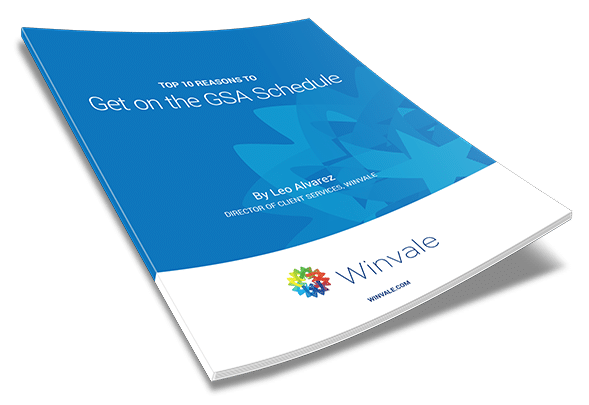Winvale Blog
The latest insights for government contracting success, GSA Schedule assistance, & IT Manufacturer support.

GSA Schedule | Government Business Development | Government | Resources and Insight
By:
Kevin Lancaster
April 27th, 2012
A recent Bloomberg Government study reminds us that Federal Government spending on multiple-award contracts (MACs) rose 49 percent to $121 billion over the last four years, more than double the growth rate of all other contracting programs within the Federal Government.

Technology | Resources and Insight
By:
Kevin Lancaster
April 23rd, 2012
Over the past year the Department of Defense (DOD) has been conducting the Defense Industrial Base (DIB) pilot program which increased the amount of classified and unclassified information flowing between the DOD and private industry. The pilot included 17 defense companies and internet carriers AT&T, Verizon and CenturyLink.

Do you know what the real benefits of being on the GSA Schedule are? Learn the top 10 reasons (and advantages) why you should consider it.

GSA Schedule | Government | Technology | Resources and Insight
By:
Kevin Lancaster
April 17th, 2012
David McClure, Associate Administrator at GSA’s Office of Citizen Services and Innovative Technologies, announced at the AFFIRM event on April 13th that the third party assessment organizations (3PAOs) will be announced in May 2012. This is a major step for FedRAMP, which will start the process for cloud service providers to obtain the provisional authorizations. These 3PAOs are an important part of the FedRAMP process, because they will be validating the cyber security control requirements for service providers. While the review is being handled mainly by DHS and GSA, the entire Joint Authorization Board (JAB) will have the final say on who will be a 3PAO. The JAB consists of the Chief Information Officers from GSA, DHS, and DOD. Department of Homeland Security Chief Information Officer, Richard Spires, said that once the 3PAO’s are picked in May, he expects the program to take-off in June of this year.

Technology | Resources and Insight
By:
Steve Young
April 9th, 2012
West Cheshire College, a leading vocational college in the northwest part of England, is the first college to implement a real time location tracking solution. This technology will enable West Cheshire to precisely track, analyze and manage student movements around the buildings’ free flowing public and learning zones. The variety of data being received via real time reporting will allow the college to see which students are in class at any given time. The college can act on this data based on student movement patterns within the building to efficiently allocate resources and optimize staff and resourcing capacity.

Technology | Resources and Insight
By:
Kevin Lancaster
April 4th, 2012
This week the Obama administration put out a new initiative for Big Data. Six agencies (DoD, DoE, DARPA, NIH, NSF, and USGS) have dedicated over $200 million to ensure this is a successful program. John Holdren, assistant to the president, stated that many more agencies will be involved in the future. NASA and NOAA will be the next agencies to enter the big data push. These are especially important because of the quantity of data they both collect. The government plans to close over 450 data centers nation wide. This will require data centers to be more robust in all aspects. This incluudes server’s space availability to meeting all cyber security standards. With fewer data centers the new data centers will store and process larger amounts of data. This will also allow for agencies to have better communication and be more efficient in their efforts.

By:
Kevin Lancaster
March 19th, 2012
"People desire to use their consumer devices to access their corporate networks," Troy Lange, NSA's mobility mission manager, said in an interview. "This is about bringing efficiencies and capabilities that people are used to in their everyday lives and extending that to our national security mission.
Copyright Winvale | All Rights Reserved